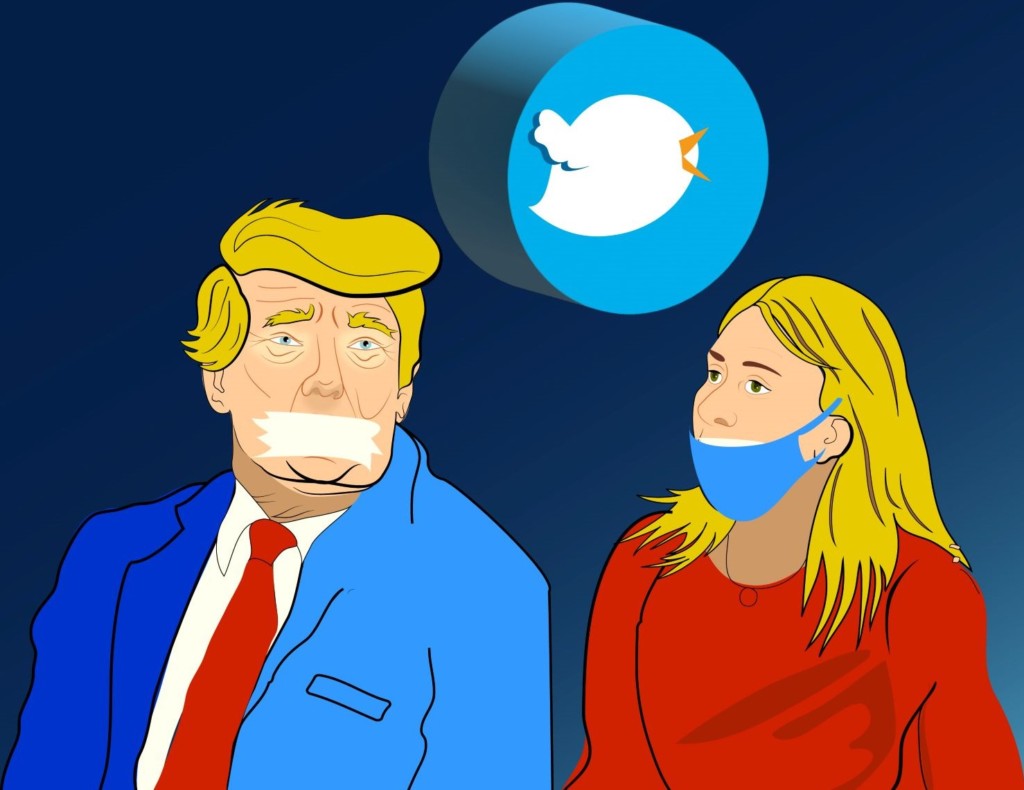
What if banning these right-wing agitators inadvertently cost us the potential to actually address some of the worst COVID-19 misinformation? Surely even the worst actors have a good moment or two, right?
Is it possible that banning controversial speakers could have consequences?
By Matthew Fraser, Editor in Chief
After the constant hair-on-fire news frenzy of the past four years and 2020 in particular, the past few months have been a relatively nice respite. Although COVID-19 has wiggled its way into just about every aspect of our lives and brought extraordinary amounts of fear with it, compared to the energy of the 2020 news cycle and the years preceding it, this isn’t so bad. Maybe the most fascinating part of ill-defined media peace is that its source is not immediately clear.
I’d wager that whether people think about it consciously, one huge part of this air of calmness has been the removal of former President Donald Trump from all of the mainstream social media networks. In turn, this removal has meant that there is less fodder for news networks and tabloids to snap up and regurgitate as headlines. Even if media execs wish for a return to the Trumpian news cycle and the attention that it brought, the public probably does not want to wonder what the next tweet might lead the world into. But it might be worth asking, whether this new peace and quiet is actually beneficial.
Barely three days after the capital had been stormed by his supporters, CNN Business reported Twitter’s decision to permanently suspend the @realDonaldTrump Twitter account. The ban also explicitly prevented Trump from using a surrogate account to post his thoughts. This act was so strict that CNN reported that even the Trump campaign team had their official account banned for a perceived violation. All in all, though Twitter did not suspend the @POTUS (President of the United States) or @WhiteHouse accounts, the ban effectively put a muzzle on the then outgoing president.
Fast forward almost exactly one year and the highly controversial and almost permanently embattled Georgia Representative Marjory Taylor Greene (MTG) is banned from posting on both Twitter and Facebook. In MTG’s case, the ban comes after repeated violations of Twitter’s COVID-19 misinformation policy. As Politico reports, MTG had already had all of her committee assignments stripped from her due to her behaviour; plus she had already come under intense scrutiny for numerous social media posts that have expressed Islamophobic, anti-semitic, racist and conspiratorial ideas. Most recently, she indicated that “Second Amendment rights” may have to be used because: “[The Democrats are] doing exactly what our Founders talked about when they gave us the precious rights that we have.”
When put like that, it seems to make sense that Twitter banned these two individuals. Between them is a plethora of directionally violent, generally unsettling, and overall harmful comments that have been forced into the public eye and ultimately the public record by their use of social media. It should seem obvious that we are better off with them effectively silenced and their reach drastically reduced. But what if the act of banning them has created problems of a new type? What if banning these right-wing agitators inadvertently cost us the potential to actually address some of the worst COVID-19 misinformation? Surely even the worst actors have a good moment or two, right?
The problem with banning politicians like MTG but more importantly Trump is twofold; first is that if social media companies have the unopposed ability to ban politicians, they have an almost unreasonable level of leverage and sway in the public discourse. The second is that with that leverage, they can guide attention and focus on to or away from their preferred political teams. Perhaps the most unsettling part is that we have actually seen these companies flex this ability in real-time.
In February of 2021, the BBC reported that the Australian government began passing a bill that would force social media giants like Facebook and information distributors like Google to pay news publishers for the media that they share through these platforms. In the eyes of these media and information entities, this was a problem. As a result, Facebook responded by removing almost the entire Australian media sphere from its platform. Overnight, Australian newspapers big and small were barred from posting or sharing on Facebook. The ban was so thorough that many pages were made unavailable and people outside of Australia were blocked from sharing articles that originated in Australia too.
If that wasn’t enough, several Australian government pages were also blocked, meaning that Facebook had effectively placed an information embargo on an entire country out of spite. The company blocked key governmental agencies including emergency services like the police, the Bureau of Meteorology (which distributes weather and natural disaster information) and health services. Even charities and politicians were affected. When interviewed by the BBC, an Australian man said: “It feels obviously very restrictive in what Facebook is going to allow people to do in the future, not only in Australia but around the world.” And his fears are right. Who’s to say what future events may cause a company to deplatform a country. How could anyone know when FaceBook might do something like this again.
However, when it comes to politicians, the most important thing is the reach these gatekeepers of social media can grant. In 2019, Democratic presidential candidate Tulsi Gabbard sued Google for suspending her campaign advertising account amid the election cycle. Though it is not clear that Google’s suspension truly cost her a shot at the presidency, New York Times quotes her campaign as saying “it was a sign of Google’s meddling in the election, using its market dominance to influence political discourse.”
Despite the case’s dismissal, it is also worth wondering if and how effectively something like this could hamper an election. For instance, should Trump seek reelection come 2024, it has already been guaranteed that he will not have Twitter as a campaign outreach tool. Twitter’s Chief Financial Officer publicly announced in February of 2021 that even if Trump were to be elected president, the ban would remain in place. Although corporations are not obligated to post anyone’s views, it certainly is striking that they can guarantee to interfere with a political campaign without consequence. It’s not like I want Trump to win (should he run again), but I find the concept of excluding politicians from public discourse to be a dangerous and likely grievous narrative-solidifying decision.
Most interesting is the counter-factual that was recently revealed involving Trump and anti-vaccine conspiracy theories. In August of 2021, Trump was booed on stage at an Alabama rally for recommending his supporters take the vaccine. More recently, in late December shockwaves rippled through political news media when Trump twice voiced his support for the vaccine and booster shots. First, while on tour with Bill O’Reilly, the former president openly stated that he had been boosted, and then again in an interview with Candace Owens Trump forcefully defended the safety and efficacy of the vaccines. Most startlingly, was Trump’s appearance on OAN where he accused politicians who refused to discuss their vaccine status of being “Gutless.”
It might not be a stretch to say that if Trump had still been on Twitter and other social media outlets, he would have vocally defended the vaccines that he has taken much personal credit for. For example in the same OAN interview, Trump said: “The fact is that I think the vaccine has saved tens of millions of people throughout the world. I have had absolutely no side effects.” Regardless of whether or not you like Trump as an individual, if the goal was to convince the right-wing stalwarts that the vaccine is safe and trustworthy, it is almost impossible to find a figure who would have been better suited to the task. In essence, by banning Trump from freely speaking his mind, we have potentially stunted even his most positive surprises and his sway over his base. This is not to say that I believe that 100 percent of the unvaccinated would have been convinced, but that it would have made good use of the Trump loyalty. Global News points out that MTG was forced to bridge the gap between her anti-vaccine sentiments and her Trump loyalties by saying: “We should be holding those who made the virus accountable, not fighting one another.”
Maybe I have a preternatural fear of concentrated power and the ability of corporations to affect politics. Maybe this is one of my few moments of optimism regarding Trump, but I don’t think these arguments are completely unfounded. Trump can be terrible, Marjorie Taylor Greene can be atrocious, but that doesn’t mean that Facebook and Twitter should have the ability to muzzle politicians at will. And the worst-case scenario as demonstrated by Australia is that these platforms could just deplatform a country without repercussions should they feel like it. All in all, we the people should be more cautious of the powers of they the corporations.

